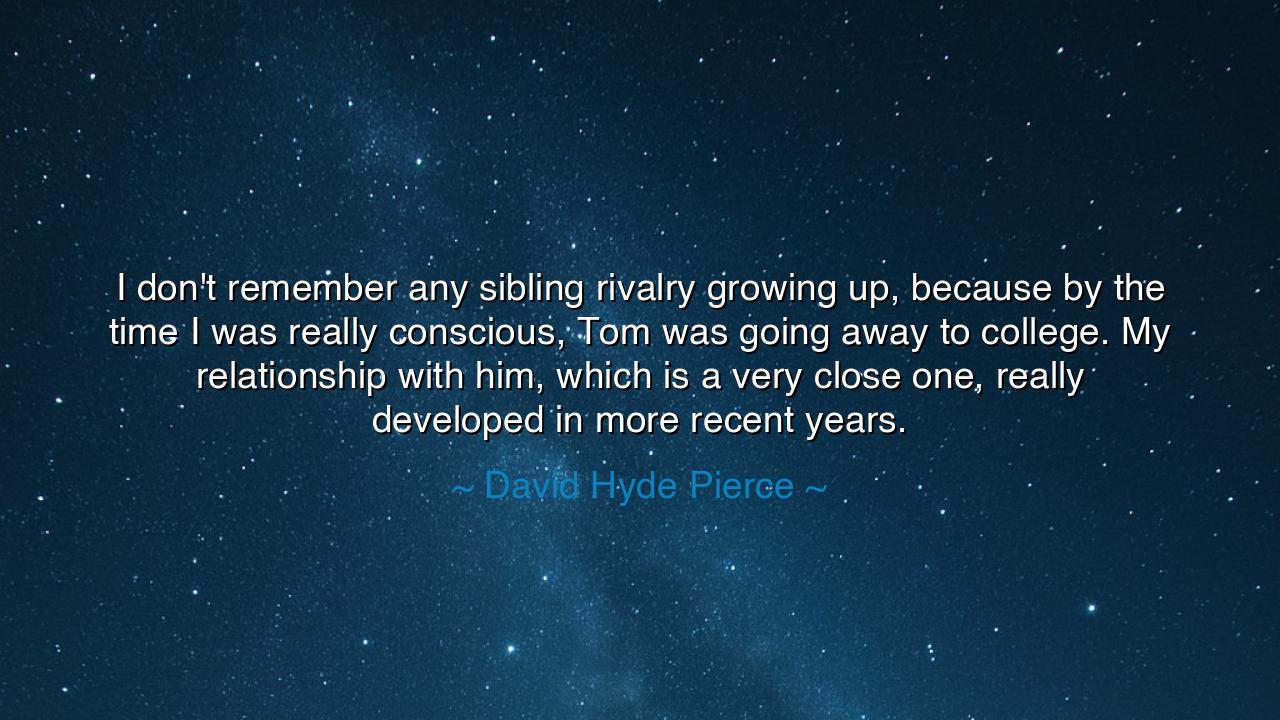
I don't remember any sibling rivalry growing up, because by the
I don't remember any sibling rivalry growing up, because by the time I was really conscious, Tom was going away to college. My relationship with him, which is a very close one, really developed in more recent years.






The words of David Hyde Pierce, “I don’t remember any sibling rivalry growing up, because by the time I was really conscious, Tom was going away to college. My relationship with him, which is a very close one, really developed in more recent years,” speak gently of the shifting seasons of family. He reminds us that bonds are not always born in youth, but may ripen later, when time and circumstance open the door to deeper connection. The absence of rivalry did not mean the absence of love, but rather that their relationship found its true flowering in maturity.
At the heart of these words lies the wisdom that family ties are not fixed in childhood alone. Though sibling rivalry often colors the stories of youth, Pierce’s experience shows another path: that closeness may come when both have walked further on their separate roads. In this way, life itself becomes the gardener, pruning distance and time, yet in the end allowing new growth of trust, respect, and shared affection.
The origin of this reflection rests in Pierce’s own memories of his brother Tom, and how their paths diverged in early years. While many brothers and sisters forge bonds in the small struggles of childhood, his tale reminds us that there is no single pattern for love. His relationship was not forged in rivalry or quarrel, but in the wisdom of later years, when hearts are more open and understanding is greater.
Let this lesson endure: love between kin is not bound to a season, but may arise at any time. Even if youth was marked by distance or separation, the years that follow may still bring closeness. Pierce’s words remind us that true relationships are not measured by when they begin, but by the strength they hold once they are found. Thus, his reflection stands as a quiet teaching—that time itself can heal, nurture, and bring forth bonds that endure for a lifetime.






Ffinnrey
I find it fascinating that Pierce says his bond with his brother really developed in recent years. It shows that relationships, even familial ones, don’t have to be defined by early childhood dynamics. How often do we overlook the potential for stronger connections with family members simply because we were too young to appreciate them before? Is there a point in life when we realize the importance of nurturing these bonds?
HLhoa Le
Pierce’s perspective on his sibling bond makes me think about the importance of time and personal growth in relationships. Sometimes, the best connections aren’t formed in childhood but later, when we’ve had time to grow individually. How much does this timing factor play into how siblings perceive and relate to each other as adults? Does it take maturity to fully understand and appreciate one another as equals?
HVD15 Nguyen Le Hien Vy
David Hyde Pierce’s reflection on his sibling relationship is an eye-opener. I wonder if his lack of rivalry with his brother might be more common in families where siblings are spaced out in age or have different life paths. Can an age gap reduce the likelihood of rivalry, or does it just change the way the sibling dynamic plays out? It makes me curious about how these relationships develop in different families.
TPThao Phuong
This quote makes me think about how sibling relationships can evolve over time. While many of us experience that sibling rivalry when we're young, it seems Pierce’s relationship with his brother only grew stronger after they were apart for a while. How often do we see sibling dynamics change once we enter adulthood? Do we sometimes need distance to appreciate one another and form deeper connections?
YNYen nhi
I find it really touching that Pierce mentions his close relationship with his brother developing in more recent years. It makes me wonder how many people feel their relationships with siblings strengthen as they get older. Is it because we become more mature and less focused on competition, or does life simply provide opportunities for deeper connections once we’re past the hustle of childhood?